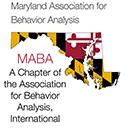BCBAs Expanding the Reach of ABA
Registration: Registration is FREE. Please register HERE: MABA+VBU Summer Series
Continuing Education Credits: 2 FREE BCBA continuing education credits will be offered at each Summer Series event. No APA continuing education credits will be provided.
Event Information
June 25th 3:00 pm (EST) – 5:00 pm (EST)
Dr. Annie McLaughlin, Ph.D., BCBA-D, LBA; Annie McLaughlin Consulting, LLC
Don’t Say THAT at IEP Meetings: An Ethical Guide for Behavior Analysts (* 2 Ethics CE)
July 23rd 3:00 pm (EST) – 5:00 pm (EST)
Dr. Linda Copeland, M.D., BCBA, LBA; Contra Costa Health Plan
A Perspective on Medicine and Behavior Analysis (*2 BCBA CE)
August 27th 3:00pm (EST) – 5:00 pm (EST)
Dr. Benjamin Thomas, Ph.D., BCBA-D, COBA; Nationwide Children’s Hospital
Caregiver-Mediated Treatment of Pica in Children with Neurodevelopmental Disorders (*2 BACB CE)
For more information, please email us at info@mdaba.org.
More information about our community partnership program coming soon!
Meet our 2025 Summer Series Speakers!
June 25th 3:00 pm – 5:00 pm (EST)
Presenter: Dr. Annie McLaughlin, Ph.D., BCBA-D, LBA
Dr. Annie McLaughlin is a board certified behavior analyst-doctoral and IEP advocate who helps behavior analysts expand their work into special education advocacy. She runs a thriving consulting practice supporting families as they navigate the special education process and leads a small but mighty team dedicated to making the IEP process clearer and more collaborative. In addition to family advocacy, Dr. Annie and her team consult with school districts across the country, provide national public speaking on special education topics, and support psychiatric hospitals in building effective systems for individuals with complex needs. Dr. Annie is a mom of three, a former special education teacher, and passionate about helping professionals make a difference.
Title: Don’t Say THAT at IEP Meetings: An Ethical Guide for Behavior Analysts
Abstract: Behavior analysts bring valuable expertise to IEP teams — but without a strong understanding of the special education system, even well-meaning input can unintentionally hinder collaboration, misalign with IDEA (federal special education law) requirements, or push against ethical obligations of behavior analysts. In this training, Dr. Annie McLaughlin, BCBA-D and experienced IEP advocate, teaches behavior analysts how to recognize common missteps, avoid statements that can disrupt effective teamwork, and deliver recommendations that are both educationally relevant and legally sound. Participants will learn how to align behavior analytic practices with special education requirements, communicate within their professional scope, and strengthen their impact through ethical, collaborative participation in the IEP process.
Learning Objectives:
- Participants will be able to identify foundational special education law requirements, including IDEA principles such as FAPE, LRE, and procedural safeguards in order to understand the behavior analyst’s role within the process.
- Participants will be able to recognize and differentiate statements and actions during IEP meetings that either promote or hinder collaboration among IEP team members while continuously centering the student’s needs.
- Participants will be able to apply relevant BACB ethical guidelines to engage in active, meaningful, and legally compliant participation as a behavior analyst within the IEP team structure.
July 23rd 3:00 pm – 5:00 pm (EST)
Presenter: Dr. Linda Copeland, M.D., BCBA
Linda Copeland MD, BCBA received her bachelor’s degree in physiology from UC Davis and graduated with honors from the UC Davis School of Medicine in 1979. She completed her residency in Pediatrics at the University of Iowa Hospitals and Clinics, where she also did fellowships in Child Psychiatry and Developmental-Behavioral Pediatrics.
She worked at Alta California Regional (a developmental regional center) for 6 years, where she co-authored a Sierra Health Foundation grant in 1993 to develop ABA behavioral intervention services working with the UCLA Young Autism Project under Dr. Ivar Lovaas. This resulted in her becoming one of the founders of the first Families for Early Autism Treatment (FEAT) non-profit group in Sacramento. She earned her Board Certification in Behavior Analysis (BCBA) credential in 2009 after taking the required graduate studies at California State University, Sacramento.
Dr. Copeland served on the Community Advisory Board for the CHARGE (Childhood Autism Risk from Genes and the Environment) study at the UC Davis MIND Institute for a decade. She held a part-time faculty position teaching at the Fresno-UCSF Pediatric Residency Training Program for 5 years. She also worked as an independent contractor with the UC Davis MIND Institute to assist with various research studies that included the Autism Phenome Project (APP) and the STAAR study, the latter of which focused on the treatment of anxiety in children with autism spectrum disorders. Since 2015, she has been working as an independent contractor with Contra Costa Health Plan doing insurance authorizations for ABA therapy.
Her early scientific publications include research on ADHD and childhood aggressive conduct disorder. Her most recent publications include several articles on autism diagnosis & pathophysiology, ABA treatment for autism and consulting between Behavior Analysts and the medical profession. Dr. Copeland served on the Master’s Thesis Committees for 3 graduate students under the tutelage of Becky Penrod Ph.D., BCBA-D. Additionally, Dr. Copeland has consulted with the development of the non-profit Consortium for Health Action to help children with autism in Viet Nam and has been a speaker for international symposia on autism spectrum disorders in the United States, Europe and the Philippines.
Title: A Perspective on Medicine and Behavior Analysis
Abstract: Dr. Linda Copeland MD is a board certified Developmental-Behavioral Pediatrician and holds a BCBA credential that daily informs her medical work. Per BACB/CASP ethical guidelines, Behavior Analysts must consult with medical professionals when treating behavioral conditions which may reasonably be influenced by medical/biological factors. Awareness of how medical factors can manifest through behaviors and how to address these through medical collaboration is vital. In turn, health care providers can be more effective by networking with Behavior Analysts to employ evidence-based procedures to guide a patient’s behavior toward better health outcomes. These efforts impact many areas of a client/patient’s life that include but are not limited to health habits, improving sleep, complying with medical tests and therapy regimens and the integrated use of ABA with pharmacological treatments. Behavior Analysts have technologies that can make a significant difference in the health of Americans like addressing obesity, the risk of Type 2 diabetes and other chronic conditions by improving healthy eating, physical fitness and mental/emotional resilience. Insurance coverage for ABA has expanded across the country and needs to expand more. This will require dedicated “lobbying” by Behavior Analysts with health care systems and legislators.
Learning Objectives:
- Participants will be able to discuss specific behaviors that are potential warning signs of medical issues in clients and what medical problems might be present.
- Participants will be able to list the 5 steps that Dr. Greg Hanley & colleagues use for a comprehensive approach to sleep problems in young children and why/how all 5 steps are needed.
- Participants will be able to give several examples on how Applied Behavior Analysis (ABA) and the use of psychopharmacological medicines can be integrated to improve functioning for clients.
- Participants will be able to note ways in which behavior analysts can impact a client’s healthy eating and fitness.
August 27th 3:00 pm – 5:00 pm (EST)
Presenter: Dr. Benjamin Thomas, Ph.D., BCBA-D, COBA
Benjamin Thomas is a supervising psychologist in the Complex Behavior Program at the Center for Autism Spectrum Disorders, Nationwide Children’s Hospital, and assistant professor in the Department of Pediatrics, The Ohio State University College of Medicine. He is a licensed psychologist and Board Certified Behavior Analyst-Doctoral Level (BCBA-D). Clinically, he provides treatment for severe behavior disorders, family-based therapy and training, and consults with multidisciplinary providers to promote medical cooperation and safety.
The main area of Dr. Thomas’s research is in promoting positive development for those with neurodevelopmental disorders by understanding and treating behavioral issues. One avenue of interest has been in characterizing behavioral profiles and treatment outcomes in neurogenetic disorders linked to autism. Dr. Thomas has also worked to enhance caregiver safety and treatments for pica, a dangerous and difficult-to-treat behavior.
Title: Caregiver Treatment of Persistent Pica: Strategies and Considerations for Safety and Generalization
Abstract: Pica is a dangerous and behavior involving the persistent ingestion of nonfood substances (e.g., plastics, coins, fibers, paint chips, dirt). Research suggests that pica exhibited by individuals with neurodevelopmental disorders is often difficult to treat and can require near constant supervision. Given the risks for pica-related health complications and fatality, behavioral interventions must be effective and practical for families to implement at home. This presentation will review the assessment and treatment process for addressing pica in this population. Specifically, participants will gain an understanding of how to use screening tools and functional behavioral assessment to help identify environmental variables that promote pica and how to use results to guide safety strategies and function-based behavioral treatments. Case examples will highlight established treatment procedures such as competing stimuli, blocking, and differential reinforcement of appropriate behavior, as well as recent advancements to improve safety and minimize continuous monitoring by caregivers. Finally, discussion will focus on improved screening and contextualizing caregiver-mediated treatments for pica.
Learning Objectives:
- Participants will be able to discuss specific behaviors that are potential warning signs of medical issues in clients and what medical problems might be present.
- Participants will be able to provide overview of methods to identify variables that maintain pica
- Participants will be able to review behavioral treatment approaches to reduce pica and increase appropriate behavior.





